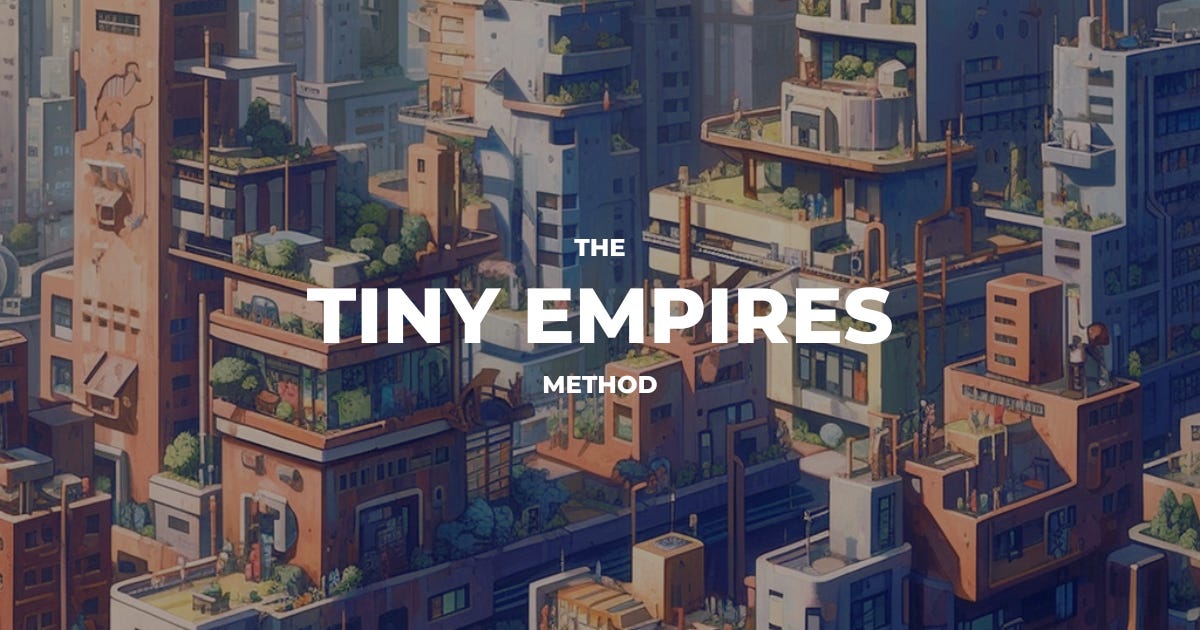Guide #15: 4 challenges of running a community
Communities are great business models. Except when they’re not.
Hey everyone, I’ve also recorded a video version of this week’s guide. If you find that useful, let me know in the comments.
I think communities are great business models. Except when they’re not.
I’ve been running the No Code Founders community for over 4.5 years now and along the way I’ve hit many challenges of growing and sustaining a community business.
In this post, I’ll share my learnings on running a community and why it’s not the right option for everyone. Let’s jump in.
1. It’s harder than you think
I think some people see community businesses as an easy option (I know I did) as it seems like you set it up, get users and then the users build the value for you. They chat with one another which creates the value, and then in turn, more people want to join the community. You can then either charge members for access or you can charge sponsors to advertise to your members. Easy.
Nope!
Just because the community exists, doesn’t mean people will talk. They might at first, but then they forget about it, or no new members join and the conversation dies, or people move from Slack to Discord or to the latest community platform. There are a whole bunch of things that can happen which will affect your business. It’s not like a normal business where you have products or services that stay the same all the time. This is a people business and you’re relying on the people continuing to act in the same way forever, but they don’t. That’s not how people work. One of the biggest challenges that communities face in every stage of their development is keeping the conversation going. When it dies, it’s really hard to get it started again and can involve manually linking people up, initiating conversations etc.
If people stop talking, your revenue stops too. Members don’t want to pay for access to a dead community, and neither do sponsors.
2. Sponsor monetization is a hard sell
One of the great things about community building is that it’s a genuinely great way to deliver value to sponsors. Unlike other advertising options which offer one-off promotions, community sponsorships offer businesses the chance to interact with customers in more organic ways, by engaging in communities directly.
Many companies have recognized this and jumped into community-focused sponsorships.
But most haven’t.
For those companies, community sponsorship is an untested marketing channel and they can be very wary about spending any serious money with a community, which can make it a very hard sell if you’re planning to monetize through sponsorships. One of the ways around this is to break up the sponsorship and sell different forms of advertising separately. For example, you could sell sponsorships for your community newsletter as a standalone option, which companies are more familiar with and then use that to upsell into your other options.
3. It’s always “on”
This is especially relevant if you’re a solo-founder as you need to deal with the community every day. You will have new messages daily and need to constantly monitor for spam and other content to keep the community content high-quality. This can be really tough, especially when you’re on your own and you may feel a constant pull to check on it throughout the day. You might think that you could engage members of the community to become moderators but this is really tough to get right as most people don’t have the time or interest to moderate a community over the long-term, so you would most likely need to hire a community manager or part-time moderator to be able to secure this aspect of the community.
The big advantage of running a community however is that you can hear lots of different perspectives 1-to-1. This allows you to ask questions, understand pain points, network and potentially even sell products or services to your members.
4. The marketing and monetization options change all the time
When I explain the community business model to people, I normally use the analogy of being the captain of an old ship. You have a clear direction that you want to go, but the sea and the wind throw you around and prevent you getting to that destination. Sometimes as the captain, you need to change course and go the way the wind and sea are taking you otherwise you’ll sink.
In this analogy, the wind and the sea are the people in your community. As founders, we’re used to having a vision and chasing after it. With a community business however, this isn’t the case. The people in the community also feel a sense of ownership and they have their own view of what the community is and their own expectations of where the community is going. As the captain of the ship(community manager), it’s not your job to ignore the wind and the sea (community members) and push forward to your destination at all costs, but rather to feel the waves, to listen to the wind and to change course accordingly. This may mean that your community goes down a different path than you initially thought. Or it may become something you never intended it to be. It may even affect your monetization plans as you adapt to the needs and expectations of the community.
Each stage of building a community is also very different. For example:
0-100 members: often has a lot of direct outreach to find relevant people to invite to the community. It may also involve more input from you personally in the community to initiate conversations and update members on what’s happening next.
100-1k members: You may move to marketing channels rather than direct outreach, such as social media or content marketing. At this stage, the community becomes less personal and intimate, so the types of conversations will change. You can handle this through smaller groups, channels, masterminds etc. but again, this takes a lot of work.
1k-5k members: at this stage, you’re totally away from the personal approach and you may now focus on larger scale community options such as online events, facilitating meetups or creating community resources.
Each stage has it’s own unique set of challenges and you may need to change the way you market, engage and monetize at each different stage.
Don’t worry. It’s not all bad
As well as having many challenges, running a community can also be very rewarding. Some of the many benefits include:
Direct connection with a lot of interesting people, many of whom could become useful connections or buyers of your products/services
Direct insights in your industry
Ongoing monetization options once you reach scale
Options to launch other businesses on top of your community
The point of this post is not to put you off starting your own community, but rather to share some of the challenges I have faced when building a community, so that you have a better understanding of what to expect if/when you launch your own community.
If you have any questions on running a community, drop them in the comments below and I’ll respond to each one.
If you found this useful, I share 15 years of startup learnings in 3-min guides every week. Subscribe here to get every guide for free.
If you’re looking for more help
I offer 2 video courses which go into my full process for building a 1-person 6-figure business that works around your life, not the other way round. You can learn more about both of these below:
Tiny Empires: Build a 6-figure business with no funding and no staff: This is very different to most business courses which are geared towards growth at all costs. The Tiny Empires method focuses on building a sustainable 1-person business by understanding the business models and strategies that work for small businesses and optimizing them using tools and systems. By the end of this course, you should have a clear step-by-step path from idea to revenue, to allow you to build a business which works around your life. Learn more
Sales for Introverts (and people who don't like selling): This is not your average sales course. I don't use any salesmanship or sleazy tactics or endless unsolicited follow ups. Instead I focus on honesty, simplicity, human psychology and productive systems. By the end of this course, sales should no longer be a dreaded task and you will have actionable steps to become a sales master (even if you're shy). Learn more
Hire me: A few times a year, I help founders build their projects using Bubble and other no-code tools. My speciality is lean, market-ready apps. I’ve sold 4 of my own companies that were built this way. I’m currently looking for my next project. If you would like my help, drop me an email




Hi JT, thanks for this post.
I'm thinking of building an outcome-oriented-community (https://www.youtube.com/watch?v=4CFkVF57fiE) which I heard from Rob Fitzpatrick.
But, I'm trying to find more info on this community type and wondered if you know any resources related to it.